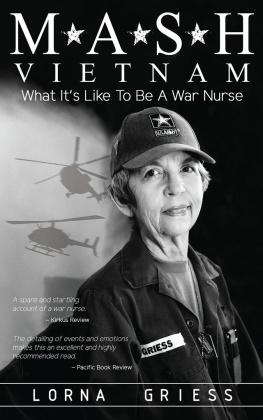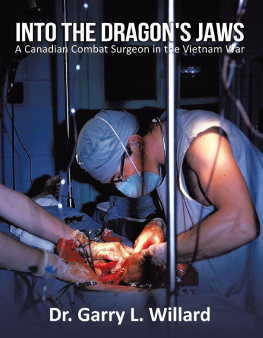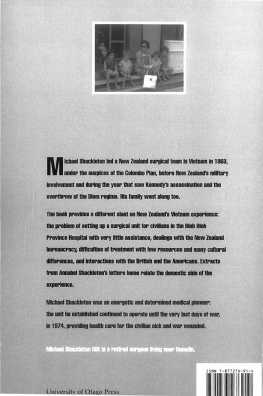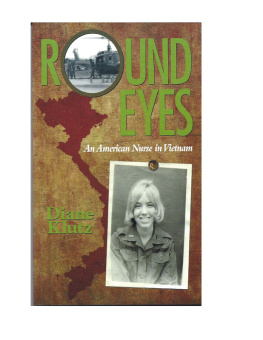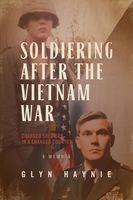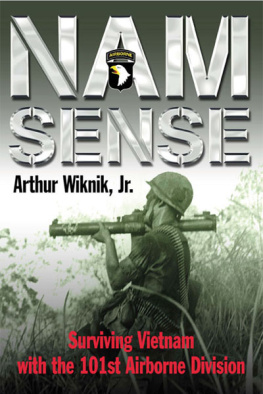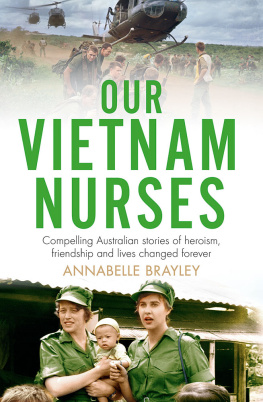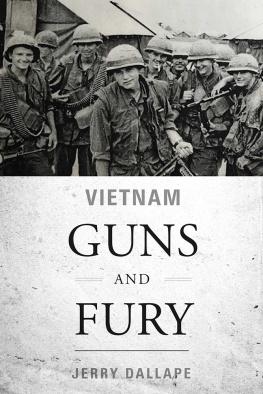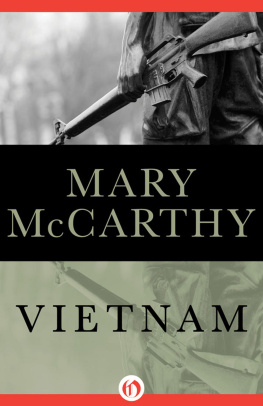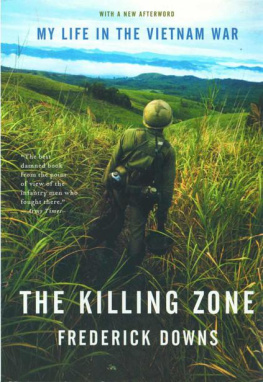Copyright 2016 Lorna Griess
All rights reserved.
Paperback | ISBN-13: 978-1-7329000-2-8
E-book | ISBN-13: 978-1-7329000-3-5
All rights reserved. No part of this book may be reproduced or transmitted in any form or by any means, electronic or mechanical, including photocopying, recording, or by any information storage and retrieval system, without permission in writing from the copyright owner.
To order additional copies of this book, contact:
Laylor Press
916-419-4074
www.laylorpress.com
Preface
T his book is about my experience living and working in a war zoneSouth Vietnam. I have written this book because the question I get most often, in a very hesitant voice, is What is it like, you know, being in a war? Is it scary? There is no short answer for that question. I usually answer with something that agrees with what they just said. Yes, it was pretty scary sometimes.
When I think about it, there is no way to explain it to someone who has not been there. People watch war movies and think they understand, but they dont. Think about all the normal things you do every day, routinely. You shower, blow-dry your hair, eat breakfast, and choose an outfit to wear for whatever you are going to do. You go out in your car, have a burger at Wendys for lunch, drive home, eat dinner and watch your favorite TV show, and then go to bed at your usual time.
In a war zone, all that normalcy, plus the security of knowing you can sleep safely and comfortably all night, is gone. Sometimes you get so tired that sleep overwhelms you until you are called to work again. You are camping out with a group of people you barely know, in a strange land, and being asked to use your skills in unusual and sometimes crisis situations. Over time, you seek a new normal out of the chaos, and the old normal fades. The comfort, security, and friends are gone. You create a new world with friends who share the experience. Often, you can run the entire range of emotions in a short period of time. It feels like an emotional roller coaster. You grow and change. You quickly find out who you are and what you can handle. Most of the time you are pleased; sometimes it is not pretty. You learn quickly and hope you are enough for what you are called to do.
Yes, living and working in a war zone is scary. It is also heartwarming, fun, educational, sad, heartbreaking, fatiguing, and energizing. It is something you will remember all your life.
Coming home was the hard part.
Chapter 1
Travis Air Force Base, California
M y heart pounded wildly as I got out of the car at the Travis air terminal. I tried very hard to give the impression that this was just another day in the life of an army nurse. That was useless. I was plain scared. I was leaving behind everything I knew and going to war in Vietnam. This was not a practice exercise; this was real. I got my duffel bag and makeup case out of the trunk, said goodbye to my family, and turned toward the terminal. During the short walk, I was able to regain my confidence and stride through the door looking and feeling like a nurse on a mission. I was a First Lieutenant looking sharp in my green uniform with skirt, nylons, polished black pumps, black regulation handbag with shoulder strap, and flat garrison hat. This was 1966, and womens uniforms, except for utility uniforms, did not include pantsuits. Fatigues would have been much more comfortable.
During the walk, I reflected on how I got here. I was twenty-eight years old, six years out of nursing school. I had served two years in the Navy at Newport Rhode Island Naval Hospital, during the Cuban Missile Crisis, and decided I did not like the Navy life because, at the time, women were not allowed on ships and there were very few places to go in the world. I got off of active duty into the inactive reserves. Instead of going home to California, I moved to New York City. The Worlds Fair was going to open soon, and I wanted to see it.
New York City was fun. I worked on the seventeenth floor of Cornell Medical Center and learned a lot. But I was getting restless. After a year of enjoying New York, I went home to Sacramento, California. I worked at a local hospital for a while, still restless. I missed the camaraderie and excitement of military life. The news was carrying a lot about the war in Vietnam and how it was escalating. I went to see the army recruiter, he sent me to see the nurse recruiter in San Francisco, and she completed the paperwork to change my status from Navy Reserve to Army Reserve. In a short time, I was off to San Antonio, Texas, for basic officer training specific for nurses, doctors, and other medical personnel, for six weeks, then on to Fitzsimons Army Medical Center in Denver to await orders for Vietnam. They arrived in three short months.
In addition to the orders, I had to make out my will and sign a letter acknowledging that if our unit were to be captured by the enemy, I would be left to care for the injured men, and I would be rescued with the men. There would be no special attempt to rescue me first because I am female.
When the door at the terminal closed behind me with a whoosh, I snapped back to reality, and fear became energy. Inside, the room was filled with men also in green uniforms. They were standing, sitting, or lying on duffel bags waiting for flights to somewhere. Most were on my flight. I pulled out my orders, which served as army travel documents, and lugged my heavy duffel bag and carry-on makeup case to the long line at the check-in window. I was excited to see Ellie and Betty, two nurses from my basic class, already in line. They had orders to the same place. We were going to Second Surgical Hospital, designated as 2d SURG, a MASH (Mobile Army Surgical Hospital) Unit in An Khe, located in the central highlands of South Vietnam. The line progressed slowly as we chatted. We checked in finally. Our duffel bags were taken and tagged and put in a pile with the others. All were the same size, shape, and color. Miraculously, none were lost.
The three of us found a place to lean in the crowded room while we waited for our flight. A plane arrived and discharged passengers into the terminal. Every one of them wore disheveled fatigues, looked battle-worn, and smelled like a mixture of mildew and something unidentifiable. I had a bad feeling that I knew where their flight originated and that I would be able to identify that smell soon. That plane left, and before long, a shiny Continental jet pulled up to the gate with the usual hiss of engines and brakes. My heart leapt a little. Our flight was called, and we boarded. This was a chartered jet configured for troop movements, which only meant that they found a way to add more seats. We wedged ourselves in with our knees touching the seats ahead and got ready for what was going to be a long flight. The three of us were the only women on board. I quietly said goodbye to California with a mixture of excitement, sadness, and terror.

